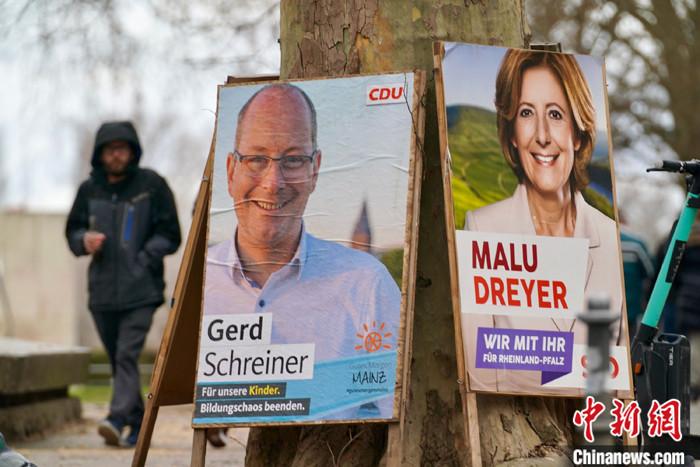China News Service, March 17th. According to a report from the European Times on the 17th, on March 14, local time, the two state assemblies of Bad Württemberg and Lahfah, Germany held elections. The ruling party of German Chancellor Merkel, Christian Democracy The league lost a lot of votes, both set a record low rate of votes, and the election year had a bad start.
On March 14, local time, Germany's "Super Election Year" started its first battle.
The picture shows on the 14th, passers-by passing through the campaign advertisements of various political parties on the streets of Mainz, the capital of Lafia.
Photo by China News Agency reporter Peng Dawei
On the other hand, the Green Party won the election and its support rate has risen sharply.
In Lai Fah state, the original coalition government composed of the Social Democratic Party, the Green Party and the Liberal Democratic Party, the so-called "Red, Yellow, and Green Traffic Light Alliance", has been strengthened; in Bavaria, the coalition government of the Green Party and the CDU is also very likely Replaced by the "Traffic Light Alliance".
Will the Green Party be in power for the first time?
According to the analysis of the report, if the "Traffic Light Alliance" maintains its momentum in the September federal election, even if the CDU and CDU alliance party wins the election, it will be unable to find an alliance partner with a parliamentary majority. , And historically reduced to the wild.
The analysis pointed out that this is not alarmist talk. Someone in the CDU has publicly issued this warning.
The latest poll results also show that the Green Party may be only one step away from reaching the "big position" for the first time.
According to the latest polls, the coalition party’s support rate has dropped by seven or eight percentage points in the past month or so. There was still 37% in mid-February, and it has now fallen to less than 30%.
The Green Party and the Social Democratic Party, in second and third place, remained basically stable. The Liberal Democratic Party climbed slightly. The total support rate of the "traffic light" tricolor has exceeded 45%.
If it rises by two or three points, it will obtain a majority of seats in the Bundestag and be able to form a coalition government.
At the same time, the Social Democratic Party has stated that it will no longer ally with the Coalition after the current election.
In this way, only the Green Party and the Liberal Democratic Party are the only alliance partners that the Coalition can fight for. Once the "Traffic Light Alliance" exceeds half, the Green Party will definitely fight for the prime minister's "throne."
On March 14, local time, Germany's "Super Election Year" started its first battle.
The picture shows on the 14th, passers-by passing through the campaign advertisements of various political parties on the streets of Mainz, the capital of Lafia.
Photo by China News Agency reporter Peng Dawei
"No one can fight" the CDU?
The report quoted the analysis of local German media as saying that in the two state elections, the personal prestige of the candidates played a decisive role.
The re-election of the Governor of Baden-Württemberg State Kreziman from the Green Party and the re-election of Mrs. Dreyer, the governor of Lafayette State and the Social Democratic Party, are well received.
With regard to the CDU, Merkel has announced that he will no longer run for re-election. Although the new CDU chairman and governor of North Rhine-Westphalia Raschett leads the most populous state in Germany, his prestige in the party and influence in Germany The force has not yet formed.
On the one hand, as far as the party is concerned, the centrist Rashet has been in power for nearly two months, and the originally expected "unity" situation has not appeared. On the contrary, the conservative right wing in the party representing the economic circle and the radical left wing representing the young wing have both been criticized. The feeling of "abandonment" has increased factional divisions within the party.
On the other hand, although Merkel has maintained the greatest stability and continuity in its policies for 16 years in power, there are also opinions that the blind pursuit of stability has made Germany’s economy, technology, and society "aging".
Therefore, inheriting Merkel's "mantle" is not necessarily what everyone wants.
Perhaps because of this, there are constant calls for Bavarian Governor Soder from the CDU to be the candidate for prime minister, even in the CDU party.
Data map: Germany under the epidemic.
Photo by China News Agency reporter Peng Dawei
Is the new crown epidemic worsening?
In addition, the new crown epidemic has been raging for more than a year, and the CDU could have won people's hearts with its early performance in the fight against the epidemic.
However, the government's anti-epidemic measures lacked foresight and continuity. The epidemic curve is like a "roller coaster". The epidemic prevention ban cannot be lifted for a long time. The people strongly hope to "lift the ban" and long for the economy to be "drought and catch the rain", but they are disappointed.
The Minister of Health Span and the Minister of Economy Altmeier, among others, not only failed to "accept fans" to the Coalition Party, but were criticized. Not long ago, it was revealed that a number of Coalition Party lawmakers used their powers to embezzle "mask rebates". The scandal also reflects the problems of the Coalition Party.
With half a year left before the election of the German Bundestag on September 26, where is the Union Party going, and how will Merkel respond?
The report finally pointed out that regardless of whether Rashet or Soder, or the Green Party is in power, in the "post-Merkel era", the "change" of the German political situation may become the biggest change in Europe.

